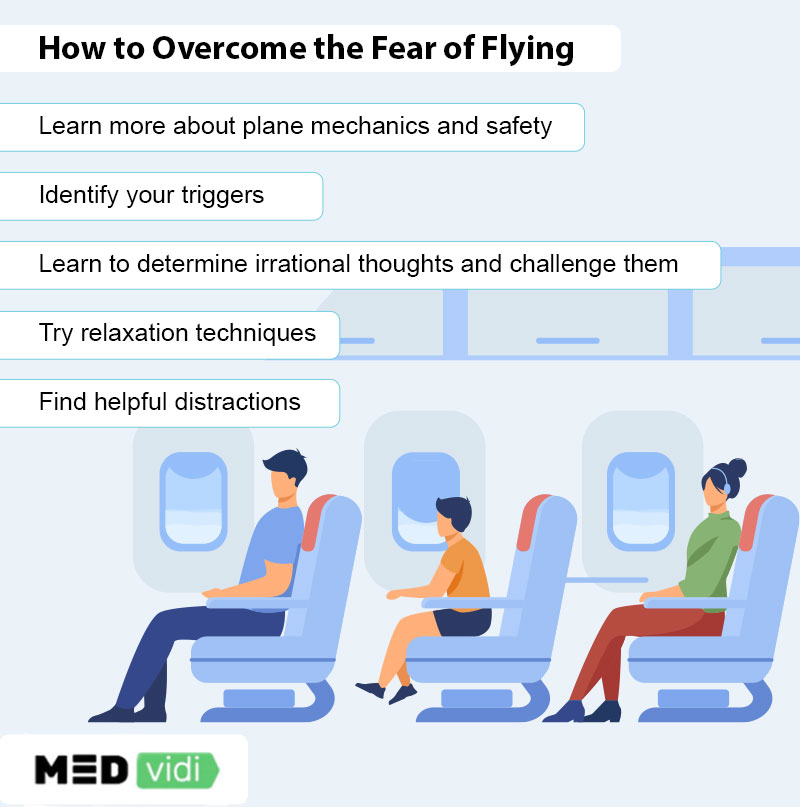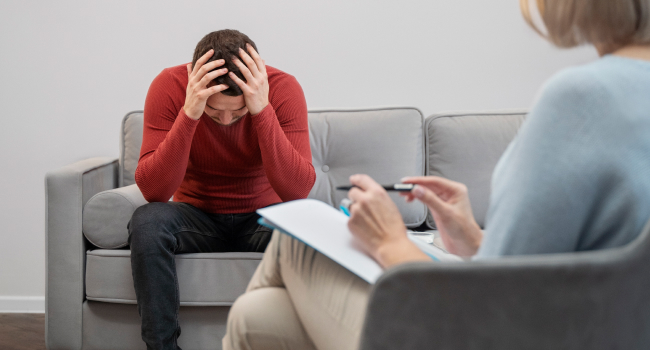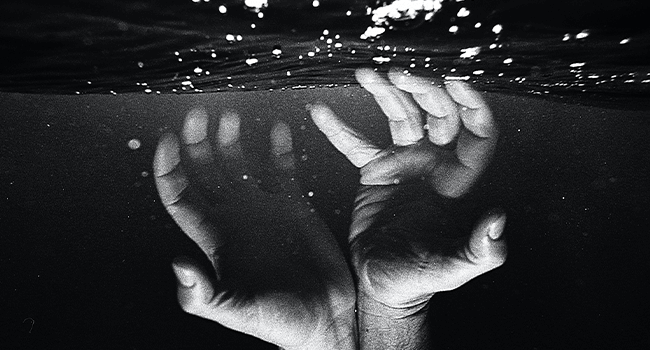Many people complain of experiencing anxiety and nervousness when they fly. Based on a 1982 study, it’s estimated that approximately
Different treatment options help to overcome phobias. Get a personalized plan for phobias treatment at MEDvidi.
How to Distinguish Aerophobia From General Anxiety?
Most individuals diagnosed with aerophobia often fear for their safety once the plane starts moving. Although they understand flying is safe, the fear is still excessive.
In minor instances, the patient may find themselves experiencing mild anxiety before or during the flight. Other individuals suffer severe symptoms like debilitating panic attacks.
Common
- Cold hands
- Nausea
- Trembling
- Increased heart rate
- Choking sensation
- Shortness of breath
What Causes the Fear of Flying
Several reasons contribute to someone becoming scared of flying. It could be a single direct trigger like having a traumatic flight incident
Another common flight anxiety trigger is feeling out of control. Most individuals realize not everything is in their power once they soar five miles above ground, which also influences aerophobia. Also, since the cabin is tight, it may feel crowded and cause fear.
Other possible causes include:
- The fear of planes developed in childhood.
- Family history of fear of flying.
- Individual reasons not related to flying (e.g. discomfort from airport procedures or fear about illness spreading among the passengers of the plane).
Talk to a professional to know what causes the fear of flying in your particular case.
5 Tips to Overcome the Fear of Flying
Most people might be unaware that aerophobia is a treatable mental health condition. There are two ways to overcome the fear of flying: flight anxiety treatment with the support of a mental health professional or the use of self-help techniques. Here are some tips to help you cope with aerophobic tendencies on your own.

Educate Yourself
The mystery of flying and lack of technical knowledge about it fuel flight fears considerably. It would help to learn about plane turbulence’s safety measures and mechanics to alleviate flight anxiety. There is a lot of free material on the internet that can help expand anyone’s knowledge on aviation, from YouTube videos to online communities for people with a fear of flying.
Recognize Triggers
Another practical tip to help cope with aerophobia is recognizing its triggers. Try observing the environment and thought patterns when the flight anxiety peaks to understand what triggers the fear responses. Possible triggers include sights, sensations, memories, or specific thoughts.
Replace Negative Thoughts With Positive Ones
Flooding the mind with negative thoughts can also contribute to developing a phobia. Avoid thinking about everything that might go wrong and focus on the exciting elements of the flight. Also, learn how to identify irrational thoughts and successfully shift focus. For example, if you think “We are definitely going to crash,” start by comparing your thoughts with actual reality. Ask yourself: “Do all the planes crash? Does this plane show signs of being damaged?” This will help you reduce the effect of cognitive distortion called overgeneralizing.
Then, find the aspects that can support a positive perspective on flying. For example, read the safety instructions one more time and check where the emergency exits are. You will get more aware of all the preparations made to ensure you will be safe even if something dangerous happens. Also, you can share your concerns with flight attendants: they are trained to handle a number of emergency situations and provide support to passengers with flight anxiety.
Want to know more beneficial tips? Consult MEDvidi doctors from the comfort of your home.
Try Relaxation Techniques
Learning how to keep calm also helps one cope with aerophobia better. You can try visualizations, breathing techniques, or progressive muscle relaxation to relieve the symptoms. It would also help to know that the more practice, the more effective the techniques will be when boarding a plane.
Find Distractions
Another solution is to carry a distraction when flying to help reduce the fear. Relaxing and distracting elements can include an exciting book, a comfort movie, or a soothing playlist.
Treatment Options for Aerophobia
The
Medications
It is common for psychiatrists to suggest patients with aerophobia take anti-anxiety medicine regularly or when the triggers occur. A person may get prescribed certain types of medications depending on their symptoms: antidepressants to maintain mood, benzodiazepine drugs for managing panic attacks, sedatives to make a person more relaxed, or beta-blockers to help avoid heart-related issues caused by severe anxiety symptoms.
Exposure Therapy
Anyone who has aerophobia will benefit from exposure therapy. It is among the best approaches to make it possible to get over the fear of flying and involves controlled exposure to flying. The experience can be through virtual reality, visualization strategies, or flight simulations.
Cognitive-behavioral Therapy
Another common method of healing for phobia is cognitive-behavioral therapy. It involves the therapist assisting patients in understanding their negative thought patterns through conversation. They also help them develop new coping mechanisms and better understand their flight anxiety triggers.
Systematic Desensitization
Using the classical-conditioning principles,
It begins with teaching the patient breathing exercises and relaxation techniques. The psychiatrist slowly exposes them to their fight against fear. As the exposure intensity increases, the patients continue practicing relaxation techniques until comfortable.
Group Therapy
If there are no underlying physical or mental health issues, it’ll help to review group therapy for mild aerophobia. The class allows patients to meet pilots and other employees of popular airlines who explain more about planes and their safety measures. It also provides an opportunity to interact with other aerophobic individuals planning to conquer their fear of flying.
Key Takeaway
Flying is among the fastest and safest transport options. The fear of planes should not prevent anyone from planning flights, as several remedies help manage the triggers and stress. Therapy and medication are enough to handle this seemingly uncontrollable feeling. If you notice such worries and other symptoms, book an appointment with MEDvidi doctors today, and they will help you overcome your phobia.








